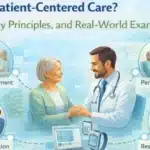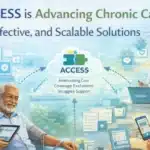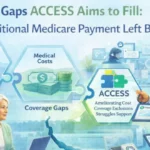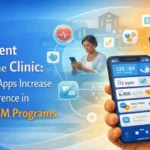Top Healthcare Industry Trends to Watch for in 2025

The healthcare industry is entering a new era in 2025, driven by digital platforms, AI, and connected devices. From remote monitoring (RPM/RTM) to value-based care models, providers are adopting smarter technologies to improve outcomes, cut costs, and engage patients in new ways.
As we approach 2025, the healthcare industry is expected to continue enhancing patient care and leveraging technology to improve patient engagement and automating clinical processes. The medical assistants, medical coding & billing staff, and care staff will be directly impacted by these changes. Those who wish to stay ahead of the curve in their respective fields must comprehend and adapt to these changes.
Table of Contents
ToggleThe Healthcare Market Stats
A few healthcare organizations are still confused about whether they should adapt to these changes or rely on the traditional methods for providing care. If you are one of those, here are a few eye-opening healthcare IT marketing stats that you should consider:
- According to a survey, the Healthcare IT Market will grow to $390.7 billion by the end of 2024. It is growing at a faster speed than the GDP of most countries.
- Processing 30 billion healthcare transactions is expected annually which will cost approximately $250 billion.
- By the end of this year (2024), healthcare spending in the United States will reach approximately $5.4 trillion, or 19.6% of GDP on average annually.
The above-mentioned stats depict a very progressive image of the Healthcare IT industry that is influenced by trending healthcare technology in 2025.
Keeping up with the healthcare industry trends, adapting to them is the need of the hour for all organizations. Now let’s dig deep into the healthcare industry trends for 2025.
- The Rise of Remote Patient Monitoring: Remote Patient Monitoring solutions came into the limelight during the pandemic and over the years it has become more popular. By 2025, it is expected to be a standard mode of care delivery. The widespread use of this solution is because it makes it easy to track patients’ vitals and health conditions in real-time that too from the comfort of their home
RPM solutions play a crucial role with the ease of data sharing between patients and healthcare providers. This will further result in more personalized treatment plans.
The advanced data analytics feature that includes AI and machine learning is enabling health professionals to gain insights into patient’s health, resulting in accurate diagnosis and early intervention by spotting abnormal trends or variations in the patients’ vitals.
This remote patient monitoring system will continue to thrive with the evolution of the healthcare industry’s technological advancements. Healthcare companies will have to mandatorily proffer comprehensive virtual healthcare solutions covering a wide array of health-related issues.
Smart devices and various apps will keep notifying patients regarding regular medication while adhering to instructions being provided to them. This will enhance chronic condition management.
-
- Impact on Medical Healthcare Providers: The healthcare professionals will become more efficient in remote monitoring of patients and will be responsible for educating patients on how to use monitoring apps and tools.
- Impact on Coding & Billing Staff: The employees responsible for coding and billing will have to stay updated with the system. Exceptional RPM solutions will ensure proper reimbursement and remain audit ready with comprehensive monitoring data and clinical notes..
- Impact on care providers: The popularity of Remote Therapeutic Monitoring will boost at-home care services as they visit patients’ homes more frequently and this will further aim at intensive patient care outside their traditional clinics & hospitals.
- Automation in Healthcare : AI has undoubtedly transformed healthcare administration by decreasing the burden of repetitive tasks and boosting accuracy. In 2025, AI-driven tools will be integrated into the healthcare industry. They will assist in scheduling reminders, coding as well as billing.
-
- Impact on Medical Assistants: Medical professionals will spend the least amount of time working manually which means paperwork will be minimal. Medical assistants must be comfortable working with AI tools and should develop new skills to operate the patient monitoring systems and navigate health technology proficiently.
- Impact on Coding & Billing Staff: With automated systems, coding staff will be focusing on complex cases where human intervention is required. Staying updated with AI advancement and understanding how the AI tools work will play a key role in being competitive.
- Impact on Care Providers: This will not directly impact medical assistants. It may only affect them while scheduling appointments, managing patient information, and communicating with other healthcare providers. Well-organized system will certainly boost workflow and patient care.
- Focus on Personalization: Individualized treatment plans offer personalized care and support, positively impacting progress. By tailoring treatment to patients’ needs, providers can address specific challenges and achieve desired outcomes. Using AI enabled RPM systems; providers can analyze patients’ unique characteristics like medical history, lifestyle and comorbidities leading to better health outcomes and enhanced patient satisfaction.
-
- Impact on Medical Assistants: Medical professionals will play a key role in making sure patients are content and have a satisfying experience. They should focus on the patient’s needs while offering personalized care and then help in creating customized plans. Efficient communication skills, sympathy, empathy, and patient care strategy will be more important.
- Impact on Coding & Billing Staff: When it comes to personalized care, results in a complex billing scenario and needs coding professionals so that the different services can come under one roof. The nuances of personalized care will be helpful for proper billing as well as reimbursement.
- Impact on Care Providers: Phlebotomists will need to adapt to a more patient-centered approach, taking extra care to understand patient preferences and concerns. Building rapport with patients and providing a comfortable experience will play a crucial role in this trend towards personalization.
- Data Security and Compliance: With the proliferation of healthcare data, cyber security is paramount, especially in protecting patient information. This will prevent breaches and we can expect stricter regulations in 2025 with more robust security protocols.
-
- Impact on Medical Assistants: Apart from proficiency in various clinical and administrative tasks Medical assistants (MAs) must also have the capabilities to work with electronic Health Records (EHRs). With EHR proficiency, MAs will be critical for ensuring the provider’s compliance with state and federal regulations. Having the necessary skills and EHR knowledge will enable MAs to safeguard patient privacy and sensitive heath data.
- Impact on Coding & Billing Staff: The coding and billing professionals should pay attention to details. They should stay updated with the latest data protection rules ensuring all billing processes adhere to the privacy standards.
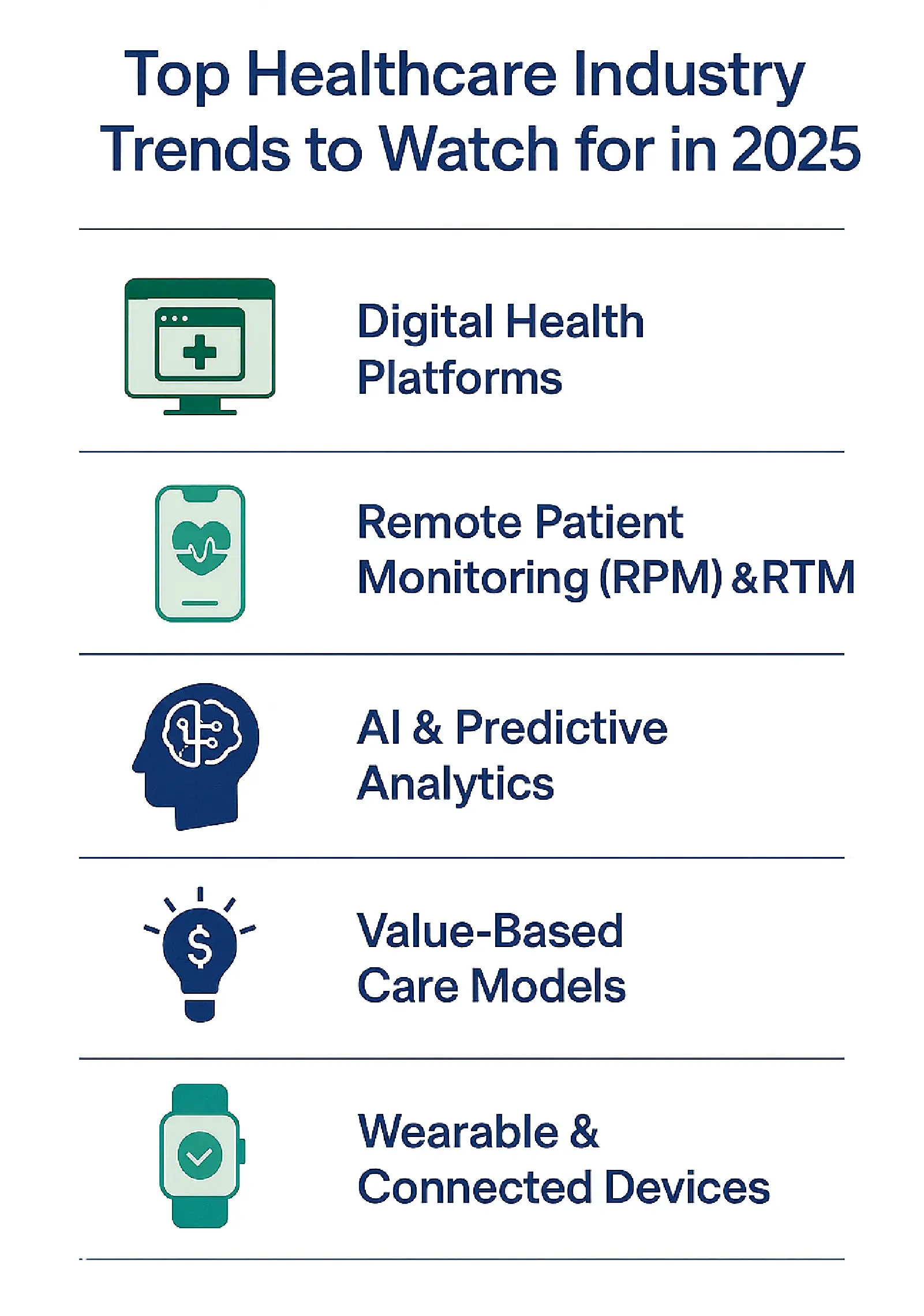
Key Highlights
There will be exciting opportunities for medical professionals, coding and billing employees, care coordination teams and care staff in the upcoming year (2025). Keeping abreast of the developments in healthcare, adopting innovative approaches to patient care and leveraging technology for patient engagement and outcomes, while protecting health data and ensuring compliance is the hallmark of delivering quality care. As providers continue to innovate and use technology in 2025, patient care and privacy will continue to be safeguarded and protected.
Key Take aways
- Digital health platforms are central to care delivery.
- AI & predictive analytics improve efficiency and outcomes.
- RPM & RTM adoption is accelerating across practices.
- Wearables and connected devices enhance patient engagement.
- Value-based care models are reshaping provider incentives.
Frequently Asked Questions (FAQs)
Some of the most important trends are digital health platforms, the use of RPM/RTM, AI-driven analytics, wearable technology, and value-based care.
AI makes predictive analytics possible, automates workflows, and helps doctors make quicker, more data-driven decisions.
Because more people are getting chronic illnesses and there aren’t enough workers, RPM is necessary for ongoing care and efficiency.
Wearables keep track of vital signs, activities, and therapeutic progress, and they send this information to RPM and patient engagement platforms.
Providers are moving away from volume-based treatment and toward approaches that reward outcomes and cost savings.
HealthArc’s all-in-one platform includes RPM, RTM, AI analytics, and compliance capabilities, making it easier for practices to use the best new technologies of 2025.
Book a Demo Today!
HealthArc offers Remote Patient Monitoring solutions that leverage the latest technologies to enhance patient care and engagement. We support healthcare professionals by using advanced tools, proactive patient monitoring, and better communication between patients and healthcare providers.
Schedule a free demo today to find out how our platform works or call us today at (201) 885 5571 to create a personalized RPM solution for your organization.
Most Recent Blogs
Categories
Related Blog
- December 24, 2025 | Read Time: 7 mins
What Is Patient-Centered Care? Benefits, Key Principles, and Real-World Examples
Patient-centered care is one of the most important ideas shaping how healthcare...
Learn More- December 19, 2025 | Read Time: 12 mins
Engagement Beyond the Clinic: How Mobile Apps Increase Patient Adherence in RPM and RTM Programs
Through the introduction of Remote Patient Monitoring (RPM) and Remote Therapeutic Monitoring...
Learn More- December 15, 2025 | Read Time: 10 mins
G2211 CPT Code: Complete Description, Billing Guidelines & Reimbursement
G2211 CPT code is an add-on HCPCS code that lets you capture...
Learn More